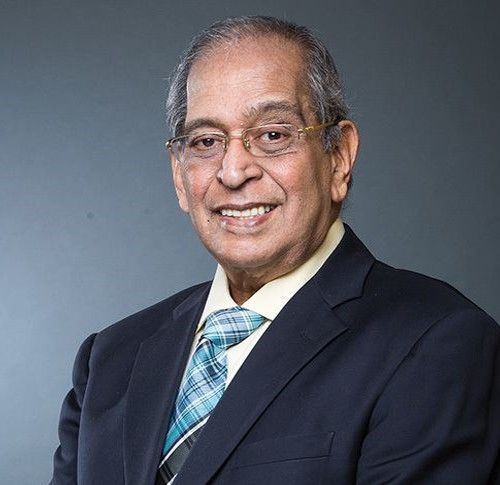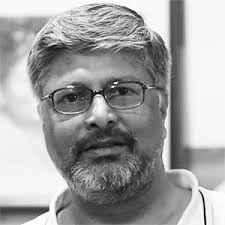N.Vaghul
Compassionate Leadership
 Narayanan Vaghul, former Chairman of ICICI Bank, is widely recognized in India for his role in pioneering the Indian private banking space. At ICICI, N Vaghul was at his institution-building best. His vision resulted in the formation of TDICI, (India's first venture capital company), ICICI Securities (investment banking outfit), CRISIL (credit rating) among others. Prior to that, N Vaghul became Chairman of Bank of India in 1981 at 44 years age, the youngest ever Chairman in a Public Sector Bank.
Narayanan Vaghul, former Chairman of ICICI Bank, is widely recognized in India for his role in pioneering the Indian private banking space. At ICICI, N Vaghul was at his institution-building best. His vision resulted in the formation of TDICI, (India's first venture capital company), ICICI Securities (investment banking outfit), CRISIL (credit rating) among others. Prior to that, N Vaghul became Chairman of Bank of India in 1981 at 44 years age, the youngest ever Chairman in a Public Sector Bank.
Describing his foundation values, says Vaghul, "Firstly, whatever I do, I should do it for the organization, for humanity but not for myself. Second was I try to get away from negative emotions, anger, jealousy – cultivate positive feelings – love, compassion. I never thought that in work situation I would operate differently and in personal life I would operate differently – they are one continuum. In personal life, if I am in meditation and as a part of the meditation, I have to observe certain discipline, the same discipline I have to observe in the office. And that becomes the basic pattern of your life." These values continue to guide Vaghul's life as he moved from being an operating leader (CEO) to a lighthouse.
The seeds of philanthropy were sowed early on in his life. Born in 1936, he grew up in a nascent India, struggling to find herself. “I was in a family of 16 people. And it was quite normal for someone or the other to go hungry… I think I looked at society, and maybe even the country, as a reflection of my own family,” he says. These seeds blossomed during his career when, while heading leading financial institutions, he institutionalized corporate philanthropy and later as a mentor to several non profits.
At an indiviudal level, if you ask him ‘Why philanthropy?", he will tell you that every human has been created so that he can leave the world a better place than the one in which he was born. "The very purpose of life is to have love and compassion for humanity at large, for all created beings." Vaghul believes in anonymous giving. If people know that the giver as the one who is giving, he has not done his duty; one is supposed to give, but not leverage the giving. Clearly, for Vaghul, kindness should be practiced for its own sake!
For corporates, he believes that “Corporate philanthropy is very much in the interest of the corporate as any corporation cannot function effectively unless society is stable and coherent. Companies that focus only on shareholders' returns fail in their objective to create overall societal wealth."
Post ICICI, his vision has guided top business leaders including Azim Premji, Anand Mahindra, Ajay Piramal and LN Mittal. In addition he has been a deeply cherished and revered mentor for many eminent social change leaders as well. Vaghul has been closely associated in nurturing several philanthropic organisations—such as Pratham, GiveIndia and the Azim Premji Foundation—that work in the realm of education, health and livelihood and more. One of his unique abilities is to offer unconditional support as a mentor- always available, but never imposing. Instead of using his position of power to veto a proposition he does not entirely approve of, he makes the reasons for his discomfiture known, and lets others take the final decision. Thus, helping people arriving at their own conclusions instead of insisting on his opinion prevailing.
For his eminence, mentorship and guidance, the Indian business community has showered N Vaghul with numerous awards and honours. Government of India awarded the prestigious Padma Bhushan to him in 2010.
Among Vaghul's inspirations is R K Talwar at SBI decades ago, on whose life Vaghul has written a book and among present day philanthropists, Azim Premji.
As one observes Vaghul, its not difficult to sense that lot of his views and orientation in life, emanates from the strong spiritual core. A keen student of Vipassana meditation and Yoga himself, he is a persuasive advocate for spiritual discipline, as a tool to realize one's full potential. He believes that the final stage of evolution in human life is reached when the sense of self and I-consciousness become completely extinct, and you realise that you are the reality you are seeking; and you become one with the cosmos.
Also read, 5 questions we asked Mr. Vaghul.
 Interviewing him, will be his long time disciple and mentee Venkat Krishnan, visionary behind multiple social change organizations and movements like Daan Utsav, GiveIndia, LivingMyPromise and beyond . Read 5 questions we asked Venkat (and more) here.
Interviewing him, will be his long time disciple and mentee Venkat Krishnan, visionary behind multiple social change organizations and movements like Daan Utsav, GiveIndia, LivingMyPromise and beyond . Read 5 questions we asked Venkat (and more) here.
Five Questions with N.Vaghul
What Makes You Come Alive?
Every morning when I wake up I thank God for giving me yet another day for continuing my journey in search of the purpose of existence. A decade back, the work I did, the people with whom I got in contact with and the organisations with whom I worked to alleviate suffering, deprivation and poverty jelled into what I was seeking for. Today at the evening of my life, with no persons to meet, no work to do, and with no contact with social organisations, I continue the journey in quiet meditation in search of the same goal.
Pivotal turning point in your life?
A chance meeting with my mentor, R K Talwar when I was in my 20s and meeting Mr Goenka, the Vipassana group were indeed the turning points in my life. In the late 90s I came into contact with one Ranjit Maharaj, an advaitin, which provided a further reinforcement to my belief systems. Talwar instilled in me the belief that we are all instruments of the divine and what we do is God's work. The work therefore has to be done with the objective of achieving perfection and not for seeking rewards. He put me into this belief not merely by talking to me but by demonstrating the way in which he lived and died. Goenkaji opened my eyes through the Vipassana meditation, not to seek knowledge through books and discourses but by reflecting deep within. Ranjit Maharaj showed me that love and compassion are the key to unlocking the mystery of existence. A lot of incidents and persons have influenced my thinking but these three stand out.
An Act of Kindness You'll Never Forget?
It is very difficult for me at this age to recall the multitudes of acts of kindness which influenced me and resulted in my present view of life that love and compassion is the only way in which we fulfil the purpose of existence. Starting with my grandmother, moving on to teachers and later in the work environment, I was the recipient of several acts of kindness which I try to replicate to the extent possible. It is indeed difficult to pick any one of them and say this particular one influenced my thinking.
One Thing On Your Bucket List?
Simple. In my journey in search of the meaning of life, I want to travel as far as possible before my lifetime ends. I know this is a long journey and it may take several births to achieve enlightenment.
One-line Message for the World?
Remember we exist in the world for a purpose. The purpose is not merely to seek pleasure and happiness but to seek the silent space within which reveals our trueselves and the relationship to the universe.